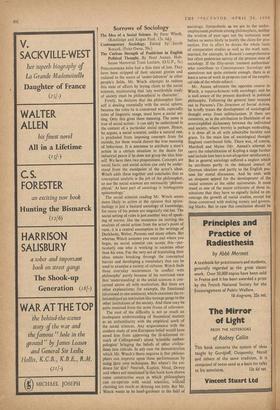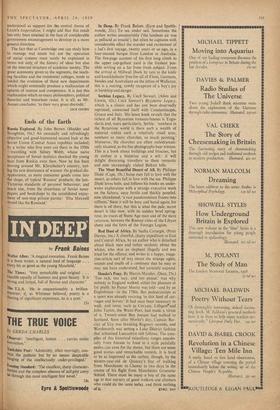Sorrows of Sociology
The Idea of a Social Science. By Peter Winch. (Routledge and Kegan Paul, 12s. 6d.) Contemporary Sociology. Edited by Jacob Roucek. (Peter Owen, 70s.) The Curious Strength of Positivism in English Political Thought. By Noel Annan. Hob-
house Memorial Trust Lecture. (O.U.P., 3s.) PHILOSOPHERS haive had a thin time of late. They have been stripped of their ancient glories and reduced to the status of 'under-labourer' in other people's fields. Mr. Winch attempts to redress this state of affairs by laying claim to the social sciences, maintaining that 'any worthwhile study of society must be philosophical in character.'
Firstly, he declares that the philosopher him- self is dealing essentially with the social sphere, because the rules he is concerned with, especially rules of linguistic usage, must have a social set- ting. Only this gives them meaning. The same is true of social action : it can only be understood in the context of a particular social system. Hence, he argues, a social scientist, unlike a natural one, is precluded from imposing concepts from the outside, for these would distort the true meaning of behaviour. It is nonsense to attribute a man's action in a certain situation to the desire for industrial peace if he does not grasp the idea him- self. We have then two propositions. Concepts are social facts; and social action can only be under- stood from the standpoint of the actor's ideas. Winch adds these together and concludes that as conceptual analysis is the job of the philosopher, so too the social sciences are necessarily 'philoso- phical.' At least part of sociology is 'misbegotten epistemology.'
The social scientist reading Mr. Winch seems more likely to arrive at the opinion that episte- mology is just a bastard sociology of knowledge, for many of his points are singularly old hat. The social setting of rules is just another way of speak- ing of norms; like the insistence on starting the analysis of social action from the actor's point of view, it is a central assumption in the writings of Durkheim, Weber, Parsons and many others. But whereas Winch assumes you must end where you begin, no social scientist can accept this—par- ticularly one who is working in societies other than his own. For the very act of translating their ideas means breaking through the conceptual barrier and developing a vocabulary that can be used to examine a variety of cultures. Winch finds these everyday occurrences 'in conflict with philosophy' partly because of his restricted view that 'understanding' in the social sciences is con- cerned above all with motivation. But there are other explanations; for example, the functional (dismissed in one sentence), which examines the re- lationshipof an institution like teenage gangs to the other institutions of the society. And these may be quite removed from the actor frame of reference.
The root of the difficulty is not so much an inadequate understanding of theoretical matters as an unfamiliarity with the empirical work of the social sciences. Any acquaintance with the modern study of non-European belief would have saved him from approving the ill-informed re- mark of Collingwood's about 'scientific anthro- pologists' bringing the beliefs of other civilisa- tions into ridicule. In any case the demonstration which Mr. Winch's thesis requires that philoso- phers can improve upon these performances by using .their own techniques. But where's the evi- dence for this? Nenrath, Kaplan, Mead, Dewey and others not mentioned in this book have shown some constructive ways in which philosophers can co-operate with social scientists, 'wiihout claiming too much or denying too little. But Mr. Winch wants to be head-gardener in the field of sociology. Sympathetic as we are to the under- employment problem among philosophers, neither the wisdom of past ages nor the testimony now before us seems likely to justify the claim for pro- motion. For in effect he denies the whole basis of comparative studies as well as the work sum- marised, for example, in Roucek's comprehensive but often pedestrian survey of the present state of sociology. If the fifty-seven 'eminent authorities' who contribute to Contemporary Sociology are sometimes not quite eminent enough, there is at least a sense of work in progress and of the empiri- cal side of the whole subject.
Mr. Annan advocates the oppogite course to Winch, a rapprochement with sociology; and he is well aware of the present deadlock in political philosophy. Following the general lines mapped out in Parsons's The Structure of Social Action, he briefly traces the development of sociological thought away from utilitarianism. If there are moments, as in the attribution to Durkheim of an oversimplified dichotomy between the individual and society, where brevity is perhaps misleading, it is done all in all with admirable lucidity and grace. To the main line of sociological thought England contributed little. There was, of course, Marshall and Maine (Mr. Annan's attempt to carry the rehabilitation of Kipling a stage further and include him here is not altogether satisfactory). But in general sociology suffered a neglect which he attributes partly to the delayed impact of German idealism and partly to the English pas- sion for moral discussion. And he ends with an eloquent appeal for the development of the social sciences at the older universities. It must stand as one of the major criticisms of those in- stitutions that they have so signally failed to en- courage the growth of social studies, except for those concerned with making money and govern- ing blacks. But in case this conclusion should be understood as support for the central theme of Lenin's Imperialism, I might add, that this result has only been attained in the face of considerable government encouragement to develop in a more general direction.
The fact that at Cambridge one can study how to manage real estate but not the operation of social systems must surely be explained in terms not only of the history of ideas but also of the internal structure of academic society. The great autonomy given to the segments, the teach- ing faculties and the residential colleges, tends to in hibit the evolution of those new departments which might eventually produce a reallocation of spheres of interest and competence. It is just this reallocation which so many philosophers, political theorists and historians resist. It is all, as Mr. Annan concludes, 'to their very great discredit.'
ACK GOODY







































 Previous page
Previous page